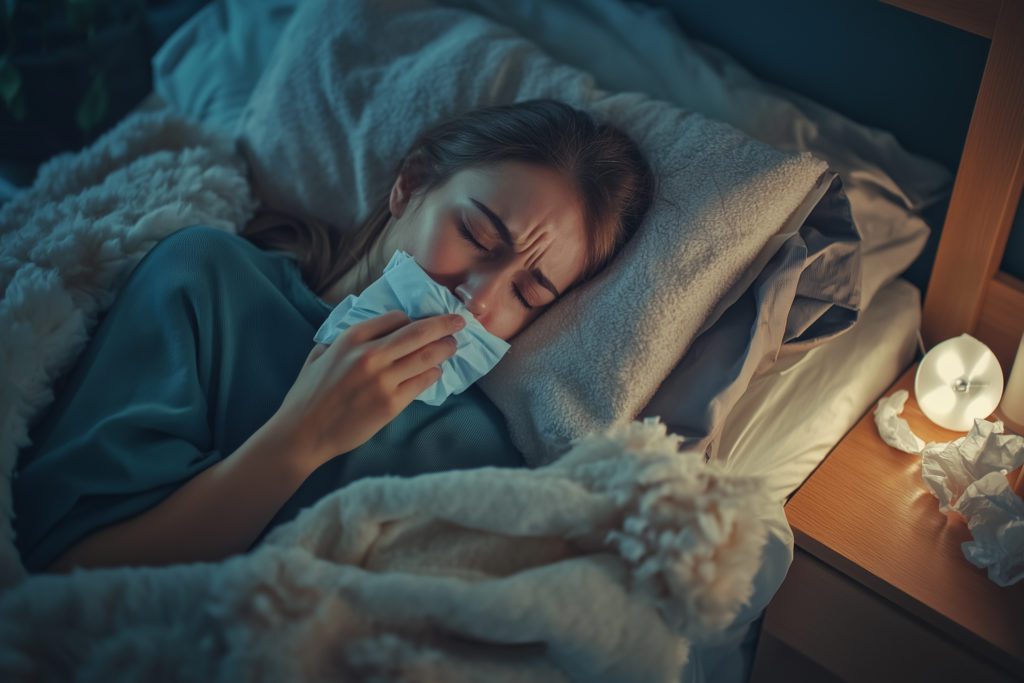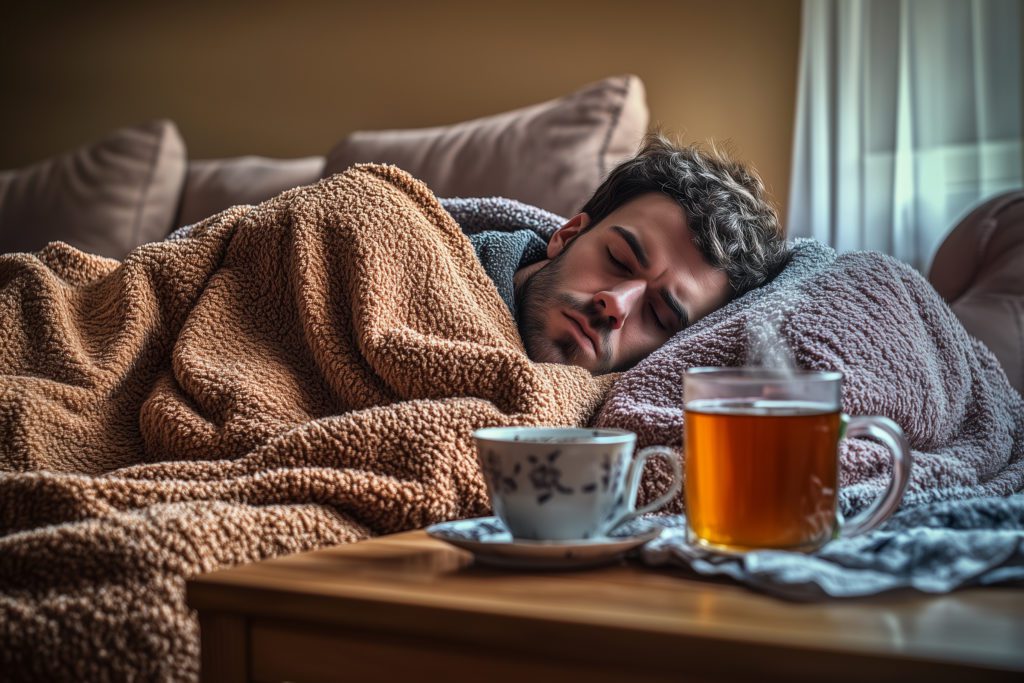
Cold, Flu, and Sleep: Managing Symptoms for a Better Night’s Rest
Coughing and congestion can disrupt your sleep. Learn how you can relieve these symptoms using specific methods so you sleep better and recover quickly.

Dealing with a cold or the flu can be unpleasant, especially when it comes to getting enough rest. From stuffy noses to body aches, you might be wondering if there’s a better way to manage these symptoms so that you sleep better at night. Fortunately, based on our research, there are plenty of ways that you can help you manage your symptoms for a better night’s rest.
In this article, we’ll explore how to deal with common sleep disturbances that arise when you have a cold or the flu, including nasal congestion, core throats, coughing, and even fevers. Whether you’re cuddled up in bed now dealing with illness or you’re looking to prepare for the future, let’s first explore how to battle arguably one of the most annoying symptoms of colds and flus: nasal congestion.
How to Relieve Nasal Congestion for Better Sleep
One of the most bothersome symptoms of a cold or flu is nasal congestion, which can often obstruct nasal pathways and make it difficult to breathe at night. If you find yourself unable to breathe through your nose, you may be tempted to breathe through your mouth, but there are ways to alleviate the congestion. Many people often just think of taking a medication, but you can opt for holistic methods, too.
First, one proven method is to use an ointment made of menthol, camphor, and eucalyptus. One study showed that putting this on people’s necks and chests when they go to bed can help alleviate nasal congestion (Source: American Family Physician). Other methods that people commonly turn to, aside from ordinary cold and flu medications, include drinking hot soups or teas. Many people find this helpful because the warmth can actually loosen nasal congestion.
Some people have also benefited from using humidifiers to increase moisture and loosen their nasal passages or even saline nasal sprays. You can also elevate your head up to ensure that you don’t get too congested while you sleep. With these tips, you can improve your nasal congestion and sleep more soundly!
Tips to Soothe Sore Throats and Coughing
Sore throats can be painful, and often, they can even keep you up at night. Coughing is another challenge for many who have a cold or the flu, as this can even disturb their much-needed rest while they recover. If you would like to soothe your sore throat, there are many remedies that you can turn to. A familiar one people enjoy is the use of throat lozenges, which can help soothe any aches and dry spots in your throat. Alternatively, you can also gargle salt water, and it provides a similar effect.
If you have a persistent cough that makes you wake up or may even be unpleasant to wake up to, there are some ways you can combat this. For instance, if you take a hot shower or bath before bed, this can help to ease some congestion so that you can breathe easily. As long as you practice a soothing bedtime routine, you’ll see some alleviation of your coughing and sore throat.
Managing Fevers and Chills While You Sleep
Managing a fever can be difficult, especially while you sleep, but the key to ensuring a good night’s rest is guaranteeing your comfort. If you find yourself with a fever or chills, try to add more layers to your bed or take away any layers that you feel are a barrier to your rest. When in doubt, leaving more covers and bed sheets to choose from is best so you can remove or add a layer whenever needed.
Temperature fluctuations can affect sleep quality because your body cools down when you sleep. When you have a fever, your sleep can be disrupted quite easily. As many medications are purely designed to help alleviate symptoms, the best thing to do is to give your body as much rest as possible (Source: South African Family Practice). That means taking medication if your aches are too much or if your fever is too high, drinking enough fluids, sleeping, and even taking naps if you need to.
How to Cope with Pain and Discomfort from Colds and Flus
We’ve talked about nasal congestion, sore throats, and fevers, but pain is another symptom that colds and the flu present that could also disturb your sleep. Body aches are common with both of these illnesses, but you can manage them appropriately so that you don’t wake up because of your pain. One method many people use is regular pain medications, like acetaminophen or ibuprofen.
Alternatively, if you want to go a more holistic route, you can engage in relaxation exercises before bed or stretch your body. If you are feeling really sick, it’s recommended to use medications to alleviate your body aches and pains as soon as possible. Otherwise, you can turn to warm baths and showers to make you feel relaxed, as well as a heated blanket. Drinking lots of water so you’re hydrated is another important aspect of your healing and sleep because then you’ll ensure you won’t wake up with a nasty headache!
Bottom Line: Prioritize Your Self-Care
If you want to manage your cold or flu symptoms to ensure you’re getting enough rest, the most important thing is to prioritize your self-care. As long as you’re taking care of yourself, drinking enough water, and managing your symptoms well with a blend of different methods, you’ll see an improvement in your physical health. Not only that, but you’ll encourage better sleep, which is essential for your recovery!
When your symptoms become difficult to manage, remember to reach out to a medical professional to ensure you get the treatment you require to recover. Feel free to read more articles on our website to learn more about sleep health, how to create healthy habits, and more. With time, you can protect your health and take steps to ensure you’re always getting just enough rest!
FAQ
How long should one rest to recover from a cold or flu?
Most people recover in 7-10 days, but sleep is crucial for faster healing. The body fights infection best with at least 8-10 hours of sleep per night. If symptoms persist beyond two weeks or worsen, seek medical advice to rule out complications like pneumonia.
Can lack of sleep increase susceptibility to colds and flu?
Poor sleep weakens the immune system, reducing the body's ability to fight viruses. Studies show that people who sleep less than six hours a night are more likely to catch colds. Sleep deprivation lowers white blood cell production, making infections more likely and recovery slower.
Does sleeping in a specific position help alleviate symptoms?
Lying flat can worsen postnasal drip and congestion, making breathing difficult. Sleeping with the head and chest slightly elevated helps open airways and prevent mucus buildup. Side sleeping may also reduce coughing and improve airflow, leading to more restful sleep.
What role does hydration play in sleep quality during a cold or flu?
Staying hydrated thins mucus, making it easier to clear airways and breathe at night. Warm fluids like broths, herbal teas, and water help soothe sore throats and prevent dehydration, which can worsen fatigue. Avoid alcohol and caffeine, as they can disrupt hydration and sleep.
Can certain foods or drinks before bedtime worsen symptoms?
Dairy products may thicken mucus, making congestion worse. Caffeinated drinks like tea, coffee, or soda can keep you awake and dehydrate the body. Instead, warm herbal teas with honey can soothe the throat, while light soups help keep the body hydrated and promote better sleep.

Written by
Marie Soukup
Marie Soukup is a seasoned copywriter, editor, and Integrative Nutrition Health Coach with a certificate from the Institute of Integrative Nutrition (IIN). With years of experience working with brands across diverse industries, Marie is passionate about holistic health and crafting compelling content.
Download Pillow
Get help
Press & News
Legal
Connect
X (Twitter)
Company
Copyright © Neybox Digital Ltd.



